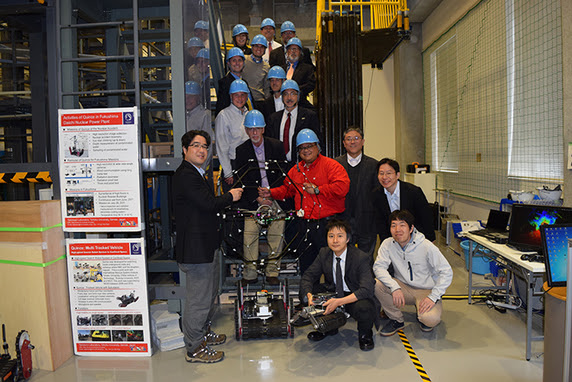 |
EM News Flash | June 6, 2016 |

EM Senior Technical Advisor Rodrigo Rimando, center, red shirt, is shown in Japan in July, when he led
a diverse team of expert roboticists to explore opportunities for
collaboration with Japanese universities, technologist, and government
laboratories.
EM Brings Unique Nuclear Niche to Robotics Expo
WASHINGTON, D.C. – EM will showcase its unique need for advanced robotics in nuclear and radiological applications at a June 9 event in Washington, D.C. open to the public
that marks the five-year anniversary of a multi-agency effort to
accelerate the development and application of robots that work beside or
cooperatively with people and solve problems in areas of national
priority.
The Congressional Robotics Caucus will host the expo for the National Robotics Initiative (NRI) to promote the progress and promise of collaborative robotics research.
At the expo, EM Senior Technical Advisor Rodrigo Rimando will provide insight on cleanup innovations and technologies such as advanced robotics.
He will join other NRI federal agency partners with vested interests in
robotics to accomplish their missions. The federal government has
invested in 230 robotics projects in 33 states totaling $150 million,
making major improvements in the country’s technology development.
Just months after EM joined NRI last year, the National Science Foundation (NSF) issued a call for robotic research and technology proposals that included EM’s needs and requirements.
It was NRI’s first request for proposals that focused on the nuclear
industry — others in the coalition addressed areas such as prosthetics,
occupational therapy, agriculture, mining, and manufacturing. EM added a
new area of scientific and engineering research centered on
radiation-hardened and radiation-tolerant robotics.
“We (EM) have a nuclear niche that most roboticists have yet to fully
address. And, we are not alone. Nuclearized robotics is needed at
commercial nuclear power plants, to support cleanup in other
nuclear-capable countries and, of course, to support the decommissioning
of the Fukushima Dai-ichi Nuclear Power Plant and other nuclear
facilities across the world,” Rimando said.
In July, Rimando led a diverse team of expert roboticists to explore
opportunities for collaboration with Japanese universities,
technologist, and government laboratories.
“Our friends in Japan have deployed robotic devices in the high
radiation fields within the units at Fukushima Dai-ichi. In doing so,
valuable data and insights were gained on the performance of those
robots in those extraordinary conditions. This will inform future
designs,” he said.
EM’s mission and cleanup challenges intersect with many domains of
robotics, involving underwater, under or below ground, aerial, and
access-restricted locations. Nuclearized robotic devices also have the
potential to improve the health and safety of EM’s nuclear workforce.
The expo will feature the latest in robotic technologies, including
those that could be modified to perform in high-hazard environmental
cleanup in nuclear facilities. Leading scientists, educators, and
thought-leaders will also conduct discussions to promote public
understanding of development of co-robots in the modern world.
NRI is a multi-agency effort between the NSF, EM, National Aeronautics and Space Administration, National Institutes of Health, and other organizations.
The caucus focuses on key issues facing the nation’s robotics
industry, where members of Congress can learn firsthand about the role
of robotics in areas necessary to improve the lives of all Americans.
The expo is from 12:30 to 6 p.m. Thursday, June 9 in Room B339 of the Rayburn House Office Building, 45 Independence Ave. SW, Washington, D.C., 20515.
Click here for more information about the expo.
|

No comments:
Post a Comment